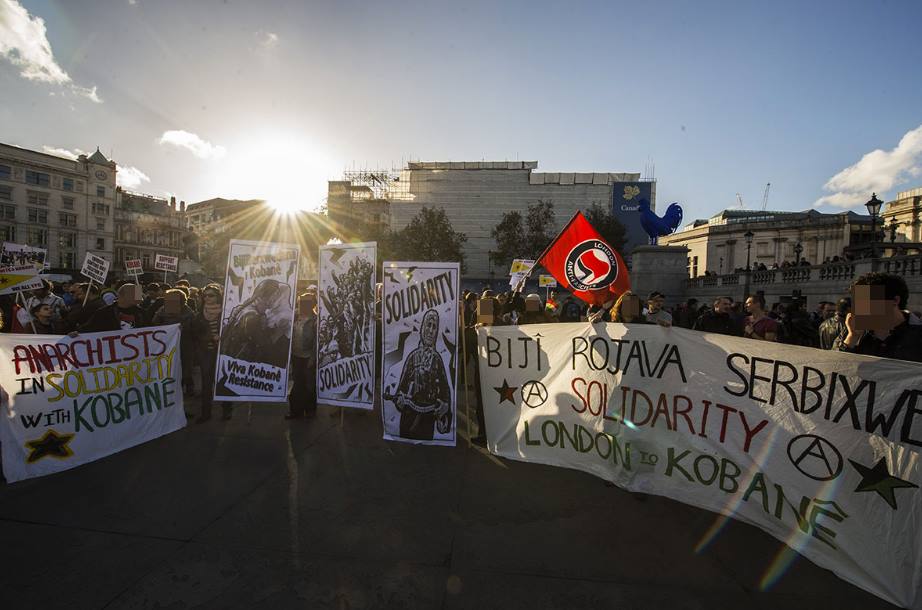This perspective was written by a Plan C member currently at the Internationalist Commune of Rojava.
The word internationalism might seem self explanatory but it carries a long history. The concept has been evolving ever since the call, “Workers of the World Unite” and the formation of the first international 150 years ago. But if we follow it down the winding path of struggle we see that with one face or another it has been a fundamental part of our collective socialist imagination. Many struggles, from the International Brigades of the Spanish Civil War, to the example of Vietnam and the attempt to unite the oppressed people of the world against colonialism in Cuba’s Tricontinental initiative, embody the principle.
In the ’90s, the uprising of the Zapatista movement in Chiapas breathed new life into an international solidarity movement that had been in steady decline for some years. It broke the spell of cynicism in the imagination of a new generation who had only seen ‘real’ or ‘actually-existing’ socialism, the one-party Marxist-Leninist ‘workers’ states’ of the Cold War, a shell of the values it was founded on. Today, internationalist values play an integral role in the revolution of North-East Syria. On the one hand, this is seen in the growing links between the Kurdish instigators of the revolution and the many other peoples who live in the geography, such as Arabs, Assyrians, Armenians and Turkmen. At the same time, the movement here has welcomed hundreds of international volunteers from across the globe to participate in and defend the revolution.

So the concept has been through many incarnations and interpretations depending on the time, place and political tendency of those who lived it, but it is also bound together at its core by common threads of understanding. At its foundation internationalism recognises the necessity for a joint global strategy that is capable of resisting with a worldwide perspective, a strategy that has at its foundation an understanding of our victory being dependent on the success of all struggles against oppression. Capitalist modernity is a global system and to fight it we need to unite beyond the borders of nation-states and on a scale proportional to modern global industry. If we fall short of this challenge, it will not only mean that we fail our comrades in different parts of the world but also that our work on the local level will be doomed to failure. In the long term, revolution can’t exist in isolated bubbles, meaning no matter how effectively we can organise locally it cannot meet its potential without an international perspective.
But what does this mean for us now? We are living in a world that is divided, despite decades of struggle for dignity and freedom, by a system that has its roots in colonialism and imperialism. A world that balances an edifice of power in the global north atop a pedestal of extraction with its base in the global south. It is the task of revolutionaries to analyse the situation in order to take the most effective action and it is an internationalist mentality that understands that this action may involve joining struggles outside of where we are born or live.
Capitalist modernity might seem as if it has swallowed the whole world, but in reality it is a chain of power with both strong and weak links. In its centres it has had hundreds of years to form, becoming rigid and strong, but in other parts of the world this hold is much more tenuous. Possibly, the most important example of a weak link right now is the Middle East. The last decades of struggle there are symptoms of the region’s resistance to being assimilated into global capitalism. As much as the US has tried to force their influence, we can also see it backfire and deepen the cycle of crisis that gave birth to ISIS. The other side of this coin is the stateless democracy built in North-East Syria that has converted the moment of chaos into an opening for the forces of socialism.
Right now, this revolution is facing the full weight of fascism. The armies of Turkey are occupying the province of Afrin since 2018 and since October 2019 a new offensive has pushed into the area of Serekaniye and Girespi. To the south, the armies of Assad and the gangs of the “Free Syrian Army” are competing for a power that leaves no space for the new revolutionary system. Anyone who believes in democracy, women’s liberation, ecology, socialism or antifascism has a duty to defend what has been built. Solidarity can exist in many forms and on many different levels, but if we understand the struggle of our global comrades as our own then we must reflect deeply on how to embody this in our actions. Just as reading the works of Marx doesn’t make you a Communist, posts on social media alone cannot be called internationalism. Of course, not everyone is in the position to uproot their lives or to travel around the world, but an internationalist perspective should be woven into the fabric of everything we do. For ourselves and the people who will live in the world we will leave behind us, as well as for the martyrs who died to leave us this heritage, we need to take the task of internationalism seriously. There are cracks forming in the links of the chain of domination that we must attack, because when it breaks it will recoil violently opening new possibilities in the strongholds of capitalism.



